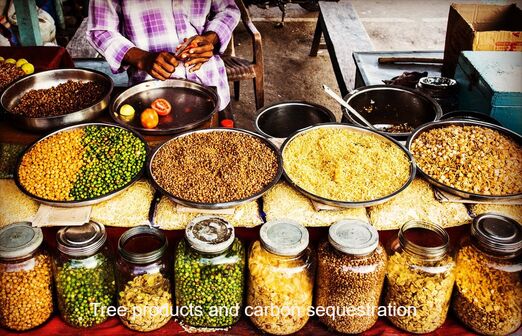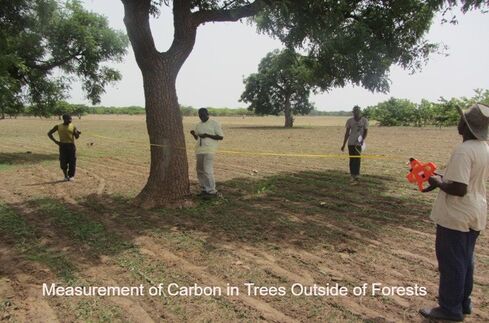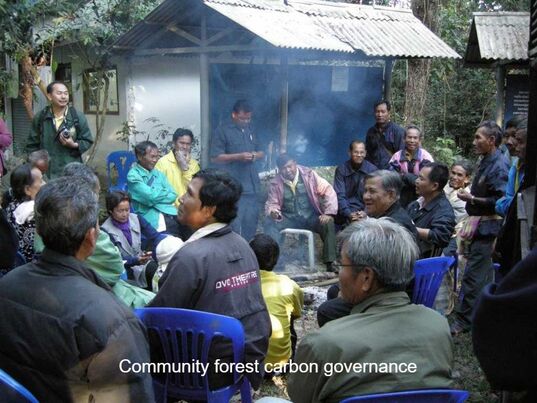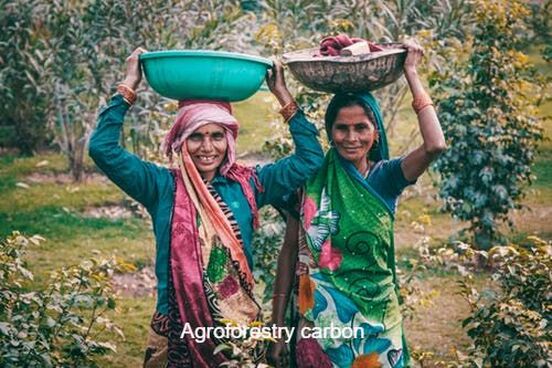Programs and Projects
 The C2M model couples two values chains and markets: carbon sequestration and natural products. These tree-based systems mitigate climate change while enhancing livelihoods and incomes.
The C2M model couples two values chains and markets: carbon sequestration and natural products. These tree-based systems mitigate climate change while enhancing livelihoods and incomes.
Carbon2Markets
This is a development model that couples carbon sequestration with natural products value chains. We recognize two important aspects of successful large scale climate change mitigation. First, millions of people in rural areas of the world live in extreme poverty. We must make climate change mitigation interventions relevant to lives and livelihoods in rural communities across Africa and Asia. Second, while most emphasis has been placed on actions in closed tropical forests, vast areas of woodlands and savannas provide opportunities for carbon management. Moreover, there are considerable opportunities to store carbon and enhance economic productivity by focusing on tree-based systems, or what we call systems of trees outside of forests.
This is a development model that couples carbon sequestration with natural products value chains. We recognize two important aspects of successful large scale climate change mitigation. First, millions of people in rural areas of the world live in extreme poverty. We must make climate change mitigation interventions relevant to lives and livelihoods in rural communities across Africa and Asia. Second, while most emphasis has been placed on actions in closed tropical forests, vast areas of woodlands and savannas provide opportunities for carbon management. Moreover, there are considerable opportunities to store carbon and enhance economic productivity by focusing on tree-based systems, or what we call systems of trees outside of forests.
 Carbon sequestration in landscapes of trees outside of forests (TOF), such as agroforestry, can be important to climate change mitigation and adaptation when they are measured at the landscape scale.
Carbon sequestration in landscapes of trees outside of forests (TOF), such as agroforestry, can be important to climate change mitigation and adaptation when they are measured at the landscape scale.
Africa
For our work in Senegal, Kenya, Malawi, Rwanda, and the DRC the aim is to build both technical and human capital to implement national REDD+ programs. There are four parts to our work. First we work on basic research questions related to carbon and forests. Second, we deploy new tools, such as remote sensing, for monitoring forest and tree carbon. Third, we build human resource capacity for measurement and monitoring of forest carbon. We deploy a model that includes technical and functional aspects of training for in-service professionals (e.g. agencies) as well as learners in formal education programs (e.g. universities). Last, we work directly with stakeholders to build carbon measurement protocols and supporting technologies. We provide a web-based platform that can be deployed to deliver Activity Data from remote sensing and Emissions Factors from forest inventories.
For our work in Senegal, Kenya, Malawi, Rwanda, and the DRC the aim is to build both technical and human capital to implement national REDD+ programs. There are four parts to our work. First we work on basic research questions related to carbon and forests. Second, we deploy new tools, such as remote sensing, for monitoring forest and tree carbon. Third, we build human resource capacity for measurement and monitoring of forest carbon. We deploy a model that includes technical and functional aspects of training for in-service professionals (e.g. agencies) as well as learners in formal education programs (e.g. universities). Last, we work directly with stakeholders to build carbon measurement protocols and supporting technologies. We provide a web-based platform that can be deployed to deliver Activity Data from remote sensing and Emissions Factors from forest inventories.
 One reason we emphasize the deployment of new measurement models is that when communities are engaged it catlyzes ownership of carbon benefits; this in turn is directly tied to governance. This picture is from a community meeting to plan and organize a local tree and forest carbon project referred to as their "carbon bank" in Thailand.
One reason we emphasize the deployment of new measurement models is that when communities are engaged it catlyzes ownership of carbon benefits; this in turn is directly tied to governance. This picture is from a community meeting to plan and organize a local tree and forest carbon project referred to as their "carbon bank" in Thailand.
Southeast Asia
We have worked in SE Asia since the 1990s, focusing on deforestation, land cover change, and carbon monitoring. We are now focused in Indonesia, Thailand and Vietnam. We work along two paths. First we are developing capacity within national governments for their REDD+ programs, delivering web enabled measurement tools and training courses on MRV. Second, we are working on the problem of emerging industrial forests, which are transforming large landscapes but are not well understood and documented. In Indonesia we are developing a Model Carbon Certificate Training Program to train in-service professional foresters and new university students in degree programs. This program uses our online Learning Management System.
We have worked in SE Asia since the 1990s, focusing on deforestation, land cover change, and carbon monitoring. We are now focused in Indonesia, Thailand and Vietnam. We work along two paths. First we are developing capacity within national governments for their REDD+ programs, delivering web enabled measurement tools and training courses on MRV. Second, we are working on the problem of emerging industrial forests, which are transforming large landscapes but are not well understood and documented. In Indonesia we are developing a Model Carbon Certificate Training Program to train in-service professional foresters and new university students in degree programs. This program uses our online Learning Management System.
 In India tree cover is increasing, but most of it is in landscapes of agroforestry and other systems of trees outside of forests.
In India tree cover is increasing, but most of it is in landscapes of agroforestry and other systems of trees outside of forests.
South Asia
We have fully deployed our REDD+ platform within the government of India as part of their climate change mitigation programs, and to provide technical means and capacity building for foest carbon monitoring. We have worked closely with the Forest Survey of India, several institutes of higher education such as the Indian Institute of Forest Management, and four state government forestry agencies. In FSI and IIFM we installed our REDD+ platform, including our Data and Knowledge Management system and the Learning Management System. We support State forestry departments in REDD+ technical implementation. As part of the third component of our REDD+ Platform, a Community Engagement Toolkit, we collaborated with our Indian partners, IORA Ecological Solutions and Vertiver to produce the Forests are Life campaign under the USAID funded Forest PLUS project.
We have fully deployed our REDD+ platform within the government of India as part of their climate change mitigation programs, and to provide technical means and capacity building for foest carbon monitoring. We have worked closely with the Forest Survey of India, several institutes of higher education such as the Indian Institute of Forest Management, and four state government forestry agencies. In FSI and IIFM we installed our REDD+ platform, including our Data and Knowledge Management system and the Learning Management System. We support State forestry departments in REDD+ technical implementation. As part of the third component of our REDD+ Platform, a Community Engagement Toolkit, we collaborated with our Indian partners, IORA Ecological Solutions and Vertiver to produce the Forests are Life campaign under the USAID funded Forest PLUS project.
Current Projects and Objectives
Monitoring the shifting geographies of Industrial Forests in the Tropics, NASA. The proposal aims to develop continental products that delineate areas of industrial forests in the Asia-Pacific region. We focus on the most important form of new LCLUC in the tropical forests - the increasing area and size of new tree plantations, many being displaced from the temperate zone into new source regions in the tropics.
Forest Partnership in Land Use Science, USAID. Forest-PLUS contributes to USAID/India’s Development Objective of accelerating India’s transition to a low emissions economy by encouraging REDD+ spread widely as an approach to forest management. Forest-PLUS demonstrates how improved conservation and management of forest ecosystems can reduce emissions from deforestation and forest degradation and sequester atmospheric carbon while at the same time enhancing biodiversity health, environmental services, forest-based livelihoods and social uses. Forest-PLUS achieves these objectives by developing better tools, techniques, and methods for forest ecosystem management, scientific data acquisition and analysis, increasing individual and institutional capacities, and public awareness and environmental education.
Protecting Ecosystems and Restoring Forests in Malawi, USAID. Among other activities, PERFORM will focus on building capacities for reducing emissions from deforestation and degradation (REDD+) through activities that increase both technical capacities and functional capacities to implement a national REDD+ program. PERFORM will contribute to building capacities for REDD+ monitoring, reporting and verification of carbon stocks and changes in carbon stocks of Malawi forest ecosystems.
LESTARI, USAID. This project supports the Government of Indonesia to reduce greenhouse gas (GHG) emissions and conserve biodiversity in carbon rich and biologically significant forest and mangrove ecosystems. USAID LESTARI applies a landscape approach, integrating forest and peat land conservation with low emissions development on other, already degraded land.
Capacity Building and Technical Development for Forest Carbon MRV in Provinces of Indonesia, GCF. This project supports the governments of 6 Indonesian provinces to conduct forest carbon measurements and emissions reductions as part of a international collaborative sub-national effort hosted by the Government of California and the US State Department.
Monitoring the shifting geographies of Industrial Forests in the Tropics, NASA. The proposal aims to develop continental products that delineate areas of industrial forests in the Asia-Pacific region. We focus on the most important form of new LCLUC in the tropical forests - the increasing area and size of new tree plantations, many being displaced from the temperate zone into new source regions in the tropics.
Forest Partnership in Land Use Science, USAID. Forest-PLUS contributes to USAID/India’s Development Objective of accelerating India’s transition to a low emissions economy by encouraging REDD+ spread widely as an approach to forest management. Forest-PLUS demonstrates how improved conservation and management of forest ecosystems can reduce emissions from deforestation and forest degradation and sequester atmospheric carbon while at the same time enhancing biodiversity health, environmental services, forest-based livelihoods and social uses. Forest-PLUS achieves these objectives by developing better tools, techniques, and methods for forest ecosystem management, scientific data acquisition and analysis, increasing individual and institutional capacities, and public awareness and environmental education.
Protecting Ecosystems and Restoring Forests in Malawi, USAID. Among other activities, PERFORM will focus on building capacities for reducing emissions from deforestation and degradation (REDD+) through activities that increase both technical capacities and functional capacities to implement a national REDD+ program. PERFORM will contribute to building capacities for REDD+ monitoring, reporting and verification of carbon stocks and changes in carbon stocks of Malawi forest ecosystems.
LESTARI, USAID. This project supports the Government of Indonesia to reduce greenhouse gas (GHG) emissions and conserve biodiversity in carbon rich and biologically significant forest and mangrove ecosystems. USAID LESTARI applies a landscape approach, integrating forest and peat land conservation with low emissions development on other, already degraded land.
Capacity Building and Technical Development for Forest Carbon MRV in Provinces of Indonesia, GCF. This project supports the governments of 6 Indonesian provinces to conduct forest carbon measurements and emissions reductions as part of a international collaborative sub-national effort hosted by the Government of California and the US State Department.